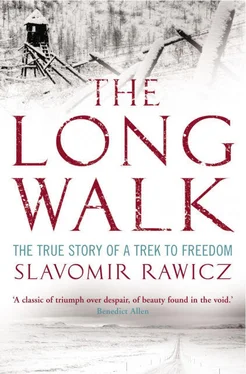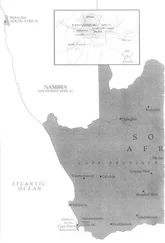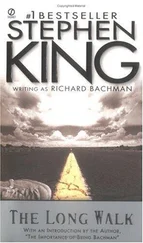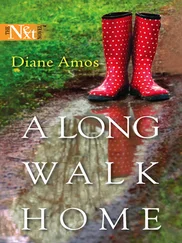‘Have a cigarette?’ he said to me on one occasion. He lit one for himself, one for me. Then he walked quietly over and stubbed mine out on the back of my hand, very hard. On that occasion I had been sitting on the edge of the chair until — as always happened — the muscles of the back and legs seized up in excruciating cramp. He walked round behind me as I rubbed the burn and kicked the chair from beneath me. I crashed on to the stone floor.
As a new and lively diversion towards the end of my stay at Kharkov, The Bull showed off with a Cossack knife, of which he seemed very proud. He demonstrated its excellent steel and keen edge on my chest, and I still have those scars to remind me of his undoubted dexterity and ingenuity.
There was a day near the end when he was waiting alone for me. He was quiet. There were none of the usual obscene greetings. And when he spoke the normally harsh, strident voice was low and controlled. As he talked I realized he was appealing to me to sign that paper. He was almost abject. I thought he might blubber. In my mind I kept saying to myself, ‘No, not now, you fat pig. Not now. Not after all this…’ I did not trust myself to speak. I shook my head. And he cursed me and cursed me, with violent and passionate intensity, foully and exhaustively.
How much can a man, weakened with ill-feeding and physical violence, stand? The limit of endurance, I found, was long after a tortured body had cried in agony for relief. I never consciously reached the final depth of capitulation. One small, steadfast part of my mind held to the unshakable idea that it was death to give in. So long as I wanted to live — and I was only a young man — I had that last, uttermost, strength of will to resist them, to push away that document which a scrawl of pen on paper might convert into my death warrant.
But there was a long night when they fed me with some dried fish before I was taken to the interrogation room. I retain some fairly clear memory of all the many sessions except this one. My head swam, I drooled, I could not get my eyes to align on anything. Often I almost fell off my chair. The cuffings and shakings seemed not to worry me and when I tried to talk my tongue was thick in my mouth. Vaguely I remember the paper and the pen being thrust at me, but, like a celebrating drunk might feel after a heavy night, there is no memory of the end of that interview.
In the morning when I came back to life I pulled my face away from the wall of my cell and smelt a new and peculiar smell. In the dim light the wall where my mouth had rested showed a wide, greenish stain. I was really frightened as I stood there, weighed down by a truly colossal feeling of oppression, like the father of all hang-overs. They drugged you, I kept telling myself. They drugged you with the fish. What have you told them? I didn’t think I could possibly have signed their damned paper, but I couldn’t remember. I felt ill and low and very worried.
Quite soon afterwards I was moved to Moscow and the Lubyanka. The guards were chatty and smiling as I left. This was a feature of Pinsk and Minsk, now Kharkov and later Moscow. The guards acted on my departure as if they were glad I was leaving. They talked freely, joked a little. Maybe it was their way of showing a sympathy in which earlier they could not indulge.
Conditions at the Lubyanka were a little easier. My reputation as a recalcitrant had obviously preceded me because I was very soon consigned to the kishka. But this kishka was clean and the periods I was forced to spend in it were shorter.
The interrogation team at the Lubyanka nevertheless tried out their special powers of persuasion on me. It was possibly a matter of metropolitan pride to try to succeed where the provincial boys had failed. There were the usual questions, the repeated demands for my signature, some manhandling, references to the filthy, spying Poles. But there was only one torture trick of which The Bull might have been envious.
They strapped me with my feet pulled stiffly out under the now familiar ‘operation table’. My arms were stretched out along the table surface, each hand tied and held separately. My body was arched in a straining bow around the table end and the pain grew into searing agony as they hauled taut on the straps. This, however, was preparatory stuff like climbing into the dentist’s chair with raging toothache. The operation was yet to come. Over the table was suspended an old-fashioned small cauldron fitted with a spout. It contained hot tar. There followed the usual pressing invitation to sign, with a promise that if I agreed I should be released immediately and returned to my cell. I think they would have been most disappointed if at that stage I had agreed to sign. The first drop of tar was hell. It burned savagely into the back of my hand and held its heat a long time on the puckered and livid skin. That first drop was the worst. It was the peak of pain. The rest were faintly anti-climax. I held on to consciousness and to my will to resist. When they said I should be glad to sign with my left hand at the end of the session, I proved them wrong. I had learned my fortitude in a very hard school.
That was the last major assault. I had been in the Lubyanka only about two weeks when I was led forth to my first and only experience of a Soviet court of justice.
THE LIVELY buzz of conversation in the courtroom suddenly died down. Mischa, his snow-white collar and shirt and elegant grey silk tie eye-catching among the uniforms and the normal utilitarian Russian civilian dress, said brightly, ‘Well, I suppose we might as well make a start.’ I had been standing then for about half-an-hour and for the first time the members of the court looked at me. The guards behind thumped to attention. Sheaves of papers were handed round.
The central seat on the long table was taken by a quiet-voiced, white-haired Russian of about 60. He wore the customary long jacket over his buttoned-to-the-throat blouse, which was black, ornamented at the neck and cuffs with cross-stitching embroidery in green and red. Flanking him were two N.K.V.D. officers in their dark blue uniforms with red flashes on the collar and red hat-bands round their military peaked caps. Mischa’s seat was at the end of the table to my left. He, I was to learn, was the chief prosecutor, and as the court prepared to start work he sat coolly looking me over. I hitched my trousers and looked at a point just above the President’s head.
It was the President, who, after a whispered consultation with the officers beside him, started the proceedings. The opening gambit was one I now knew by heart. Name? Age? Date of birth? Where born? Parents’ names? Their nationality? Father’s occupation? Mother’s maiden name? And so on through the long catalogue lying before him, complete, I have no doubt, with the answers I had wearily repeated in all my encounters with the N.K.V.D. from my arrest in Pinsk to my arrival in Moscow. If by this repetition they hoped I might vary an occasional answer, it was poor psychology. So often had I answered that any one of these questions produced always the same reply because I had ceased to have to think. It had become habit, a reflex action. The same old questions, the same old answers…
The charges were read over to me. The President (this may not have been his title but it appeared to be his function) took a long time going through the indictment. It bristled with place-names, the names of alleged Polish ‘reactionaries’, and dates covering a period of years on which I was accused of having committed specific acts of espionage against the Soviet Union. Their scope was so sweeping that I have never ceased to marvel that they missed the occasions when, as a teen-ager looking for danger and adventure, I had indeed crossed the Polish-Russian border. These charges were completely without foundation and I felt some satisfaction in the thought that if they could not torture me into admission of them in the specially-equipped interrogation rooms of a series of Russian prisons, they were unlikely to get me to change my tune in the comparatively pleasant and civilized atmosphere of this court.
Читать дальше






![Джеффри Арчер - The Short, the Long and the Tall [С иллюстрациями]](/books/388600/dzheffri-archer-the-short-the-long-and-the-tall-s-thumb.webp)





